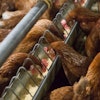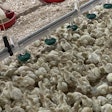
The British pig industry has produced a new health and welfare strategy, supported across the whole supply chain and launched on August 23 by the country’s chief veterinary officer Nigel Gibbens.
Based on the British Pig Executive’s latest Pig Health Improvement Project, the strategy aims to change the way endemic pig diseases are managed, mitigated and controlled across the country to boost both the health and welfare of the national herd and improve competitiveness. “Improving the health and welfare of pigs is of paramount importance to all of those involved in the industry in England," said BPEX chairman Stewart Houston. "It affects our cost of production, our ability to compete in a highly competitive EU market, our impact on the environment, the safety of the food we produce, our responsibility to the animals in our care, our reputation as a producer of high welfare pork, bacon, ham and other pork products and, ultimately, our ability to produce a secure supply of food in an increasingly volatile world.”
The key elements of the strategy are:
- Support pig producers in delivering their objectives for continual improvements in pig health and pig welfare
- Eliminate or control significant enzootic pig diseases locally, regionally and nationally
- Eliminate or control significant infections of food safety and public health concern (e.g., Salmonella)
- Develop and promote new knowledge on the assessment of welfare outcomes
- Promote the open exchange of information on the disease status for herds and regions
- Promote and encourage responsible and appropriate use of antimicrobials
- Maintain freedom from notifiable exotic and emerging diseases of pigs
- Deliver an integrated approach to improving pig health and welfare with all stakeholders, allied support industries, retailers, foodservice and government
“The strategy places a strong emphasis on preventing the introduction of new and exotic diseases, on surveillance to ensure early detection, identification and action to eliminate, as well as on biosecurity to limit spread off and on to pig farms,” said BPEX’s interim head of research and development Derek Armstrong.
He also said that pig health is also an important part of pig welfare. “Freedom from pain, injury and disease is one of the five freedoms that have been at the center of welfare policy development for the past 50 years," said Armstrong. “For an industry that prides itself on high standards of welfare, building on the improved standards of pig health over the past 10 years is a priority that is reflected in this new strategy. It aims not only to maintain welfare differentiation for locally produced pig meat, but also to engage with the supply chain to ensure that a fairer proportion of the premium that consumers are prepared to pay for higher welfare product is passed back to drive the circle of continuous improvement of welfare standards. The really encouraging part is that there are a lot of organizations committed to working together to deliver a coherent vision of health and welfare.”


















